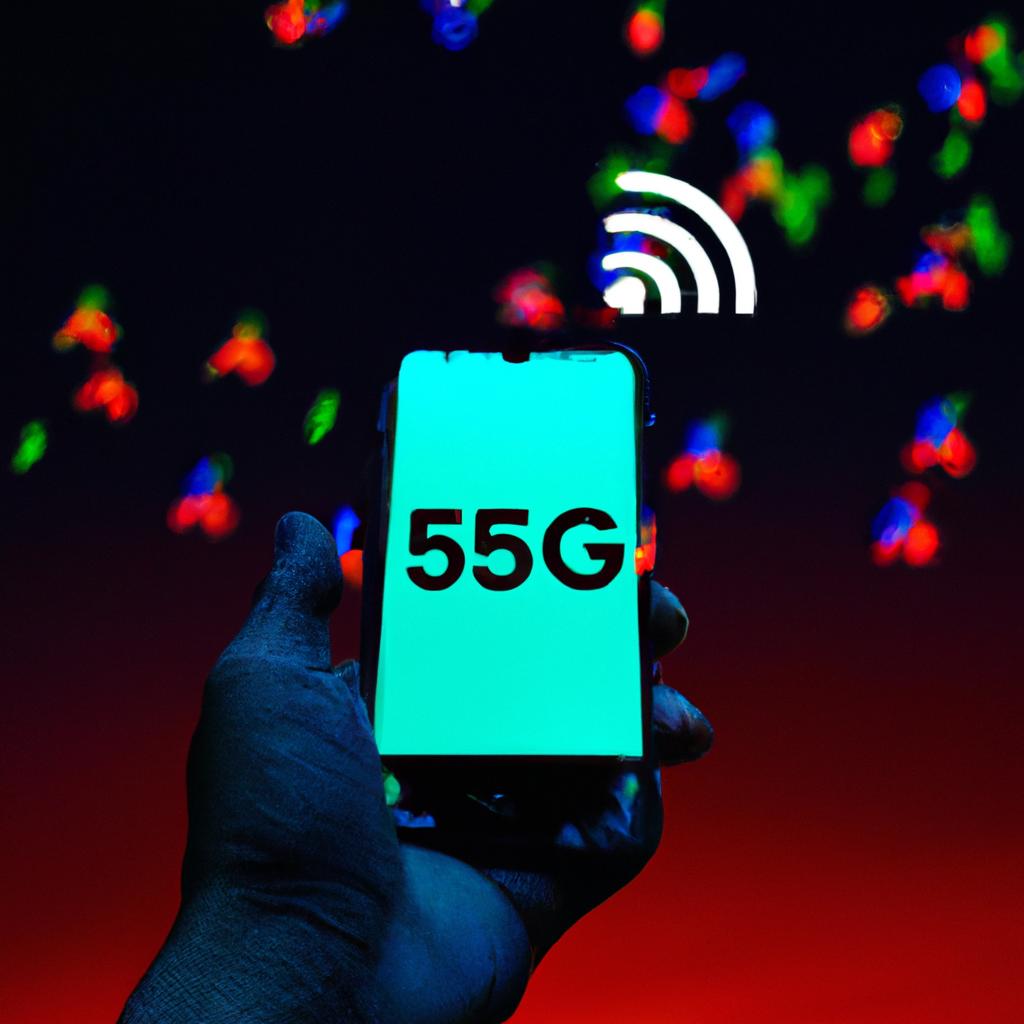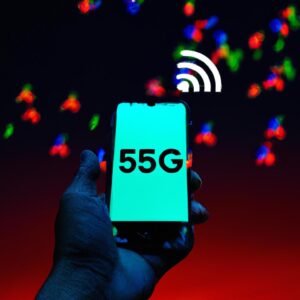Discover How 5G Tech Impacts Everyday Life

The Impact of 5G Technology on Everyday Life
5G technology is revolutionizing the way we communicate, stream, work, and even drive. As the world adopts 5G networks, the potential for new innovations and services is immense! But as with any technology, there are also drawbacks that come with it. In this guide, we’ll discuss the impact of 5G technology on everyday life, including its benefits, challenges, and potential ethical issues.
Historical Development of 5G Technology
5G is the fifth generation of cellular network technology. It is designed to replace 4G networks to offer faster data speeds, lower latency, and more reliable connections. The development of 5G technology began in earnest in 2010, and since then there has been a rapid advancement of 5G technology in terms of speed, coverage, and reliability.
Benefits of 5G Technology for Everyday Life
The most noticeable benefit of 5G technology for everyday life is the improved download speeds compared to 4G networks. This means that streaming content and video calls will be much smoother and more reliable. Other benefits include faster response times for playing games online, improved coverage in remote areas, and better use of VR and AR technologies.
Common Challenges That Come With 5G Technology
Despite the many advantages of 5G technology, there are still challenges that come with its implementation. For example, there may be gaps in coverage in certain areas, which means that some users may not have access to the same speeds and reliability that others do. Additionally, 5G technology can also be costly to install, maintain, and upgrade for consumers.
Effect on Digital Privacy
Another issue that comes with 5G technology is the potential threat to digital privacy. With increased data transfer speeds, there is an increased risk of identity theft and phishing scams which could have serious consequences. As 5G technology becomes more widely adopted, it is important to understand the implications of using such a powerful tool.
Historical Development of 5G Technology
Since its inception in 2009, 5G technology has come a long way. Over the past decade, research and development into the technology has allowed for faster speeds and more reliable connections. This has resulted in an exponential rise in usage in the form of data-heavy services like streaming, online gaming, and video calling.
Originally, 4G technology was the primary mobile network used for data transmissions. This allowed for users to access high-speed data on the move, but speeds were limited compared to today’s standards. It is with 5G that we have seen these speeds increase substantially and now mobile networks can compete with and sometimes surpass wired broadband services.
5G technology has revolutionized communication and has changed the way people use their devices. From faster download speeds to improved connectivity and reliability, 5G technology has had a huge impact on consumers and businesses alike.
Benefits of 5G Technology for Everyday Life
5G technology brings a range of benefits to everyday life, making tasks quicker and more reliable than ever before. Some of the key advantages include:
- Faster download speeds – 5G technology enables data to be downloaded up to 100 times faster than with 4G.
- Improved gaming experiences – Faster speeds allow gamers to enjoy smoother online gaming with no lag or buffering delays.
- More reliable streaming – With less buffering and jittering, streaming videos can be enjoyed with fewer interruptions.
- Improved video call quality – Higher bandwidths make video calls appear sharper and clearer; perfect for keeping in touch with distant family and friends.
Common Challenges That Come With 5G Technology
The implementation of 5G technology is not without its challenges. Despite the many advantages it offers, there are a number of issues that must be addressed in order for 5G to be successful.
One of the major challenges of rolling out 5G technology is ensuring adequate coverage. 5G networks require more infrastructure than 4G networks, meaning they need to be carefully planned and installed to ensure consistent coverage.
Another challenge is cost. As 5G requires more infrastructure, it has a high cost of installation. This makes it a challenge for some people and businesses to have access to the most up-to-date technology.
A final challenge is security. As 5G technology is rolling out faster than it can be secured, it opens up potential opportunities for hackers to exploit its vulnerabilities.
Effect on Digital Privacy
As the world advances into the 5G era, there are potential risks that come with increased high-speed internet access. One of those risks is the potential threat to digital privacy, as identity theft and phishing scams become more common.
Identity theft occurs when someone uses your personal information without permission to commit fraud or other crimes. This can happen through hacking into your computer, stealing your information from databases, or getting you to enter sensitive information into an online form. Phishing scams involve the use of emails or social media messages directing you to a website that looks legitimate, but is actually used to steal your personal information or account information.
Both identity theft and phishing scams can be mitigated by using strong passwords, two-factor authentication, and using caution when providing personal information online.
Controlling the use of 5G technology is an important consideration for both businesses and individuals. In order to ensure that the technology is used responsibly, there are several measures that can be taken.
For businesses, it’s important to ensure that safeguards are in place to protect customer data and prevent misuse. This could include strong encryption protocols, robust authentication systems, and regular security audits. It’s also crucial for businesses to have a clear policy in place for data management and storage, so that any information collected is handled securely.
For individuals, monitoring their own data usage is essential when using 5G technology. People should ensure that they only access trustworthy websites, and be aware of the risks associated with malicious websites. Additionally, it’s important to keep up-to-date with security patches and updates for all devices.
Lastly, there are various governmental regulations that must be complied with when using 5G technology, such as privacy laws and consumer protection legislation. It’s important for businesses and individuals alike to familiarise themselves with these legal requirements in order to ensure they remain compliant.
Impact of 5G Technology on Businesses
The introduction of 5G technology has had a significant impact on businesses around the world. Not only have businesses benefitted from increased productivity, efficiency, and cost savings but they’ve also been able to take advantage of innovations that will shape the future.
5G technology has enabled businesses to stay connected in ways that weren’t possible before. With faster download speeds and more reliable streaming, businesses are now able to communicate in new ways without having to worry about slow loading times or glitches.
The increase in speed has also allowed businesses to access data faster and more accurately than ever before, which means that decision-making processes can happen much quicker and with greater accuracy. This is a huge benefit for any business, as even small decisions can have big effects on the bottom line.
Overall, 5G technology has been a boon for businesses around the world. Not only is it enabling them to stay connected at lightning speeds, but it’s also helping them to access data more quickly, make decisions more accurately, and ultimately become more productive and efficient.
New Innovations Enabled by 5G Technology
The development of 5G technology has enabled a range of new innovations that have greatly improved everyday life. From driverless cars to augmented reality, 5G technology is at the heart of these new technologies that are quickly becoming commonplace.
Driverless cars, for example, rely on powerful 5G connectivity to allow cars to communicate with one another and their environment. This has enabled autonomous vehicles to safely navigate roads with ease while avoiding accidents and congested streets. This technology promises to revolutionize how people travel and could potentially lead to a world where traffic jams are a thing of the past.
Another major innovation enabled by 5G technology is augmented reality. This technology allows users to interact with virtual objects in the real world, using either mobile device or a pair of smart glasses. Augmented reality is being used in many different industries, ranging from the gaming industry to the education sector and beyond. It has the potential to transform how people shop, learn, and even work in the future.
Overall, the development of 5G technology has enabled a range of new innovations that are revolutionizing the way we live our lives. From driverless cars to augmented reality, the possibilities that 5G technology has opened up are only limited by the imagination.
Potential Ethical Concerns
With the introduction of 5G technology, there are potential ethical concerns associated with its use. One of these is the risk of manipulation, with governments and organizations having the ability to influence public opinion or political decisions with the use of this technology. For example, social media platforms that rely on 5G technology could be used to spread misinformation or to target individuals with ads targeted to their interests or beliefs.
Another ethical concern related to 5G technology is privacy. There is a potential for individuals’ data to be collected without their knowledge or consent in order to be used for marketing purposes or other commercial gain. Additionally, the technology could potentially be used to collect and store data on a massive scale, which could lead to potential abuses.
The use of 5G technology also has implications for freedom of speech. With the introduction of 5G technology, it is possible for governments and organizations to restrict individuals’ access to certain websites or platforms. This could lead to censorship or oppression of certain forms of expression, which could have a serious impact on society.
It is important to consider these ethical concerns and to ensure that necessary measures are taken to protect people’s rights and privacy when developing and utilizing 5G technology.
Impact on Education
As 5G technology continues to become more accessible, it is beginning to have a profound effect on the education sector. With faster download speeds, students are able to access online learning tools and interactive resources with ease. This has allowed for improved collaboration between students and teachers, as well as increased access to materials that could not be accessed before.
The availability of 5G technology has also allowed for innovative uses of virtual reality in the classroom. By connecting the physical environment to a virtual one, students can gain hands-on experience with materials that would otherwise be difficult or impossible to obtain. Additionally, 5G technology has allowed for advances in automated grading systems, which can provide students with instant feedback on their work.
Finally, 5G technology has provided many educational institutions with the ability to utilize remote learning practices. This has made it easier for educators to reach out to students who may be located in different parts of the world. Additionally, remote learning makes it possible for more students to access high quality education, regardless of their location.
What the Future Holds for 5G Technology
The potential of 5G technology cannot be underestimated, as its future advancements are set to revolutionize our lives in a way that is unprecedented. The advent of autonomous vehicles, massive Machine to Machine (M2M) communication networks, and virtual reality applications are just some of the possibilities that 5G technology could enable. With faster speeds, lower latency, and more reliable connections, 5G technology could allow us to access unlimited amounts of data quickly and efficiently.
A major benefit of 5G technology is the ability to support vast amounts of connected devices, called the Internet of Things (IoT). This will allow everyday objects to be connected to the network, which could open up a totally new world of possibilities. From intelligent homes and health monitoring systems to remote education and autonomous navigation, the potential applications are endless.
The future of 5G technology looks bright, and it is clear that it will have a major impact on our everyday life. Despite the challenges associated with implementation, the potential benefits make it clear that 5G technology is here to stay.
Conclusion
In conclusion, 5G technology has revolutionized our everyday life in many ways. It has enabled faster download speeds, improved gaming experiences, more reliable streaming, and improved video call quality. On top of that, 5G technology has enabled businesses to increase their productivity and efficiency, while also making many new innovative technologies such as driverless cars and augmented reality possible. Lastly, 5G technology has had an overall positive impact on the education sector by introducing powerful online learning tools and interactive resources.
As the technology continues to develop and expand, 5G technology will become more integral to our everyday lives, providing us with even more opportunities for growth and innovation.
comments: 0






